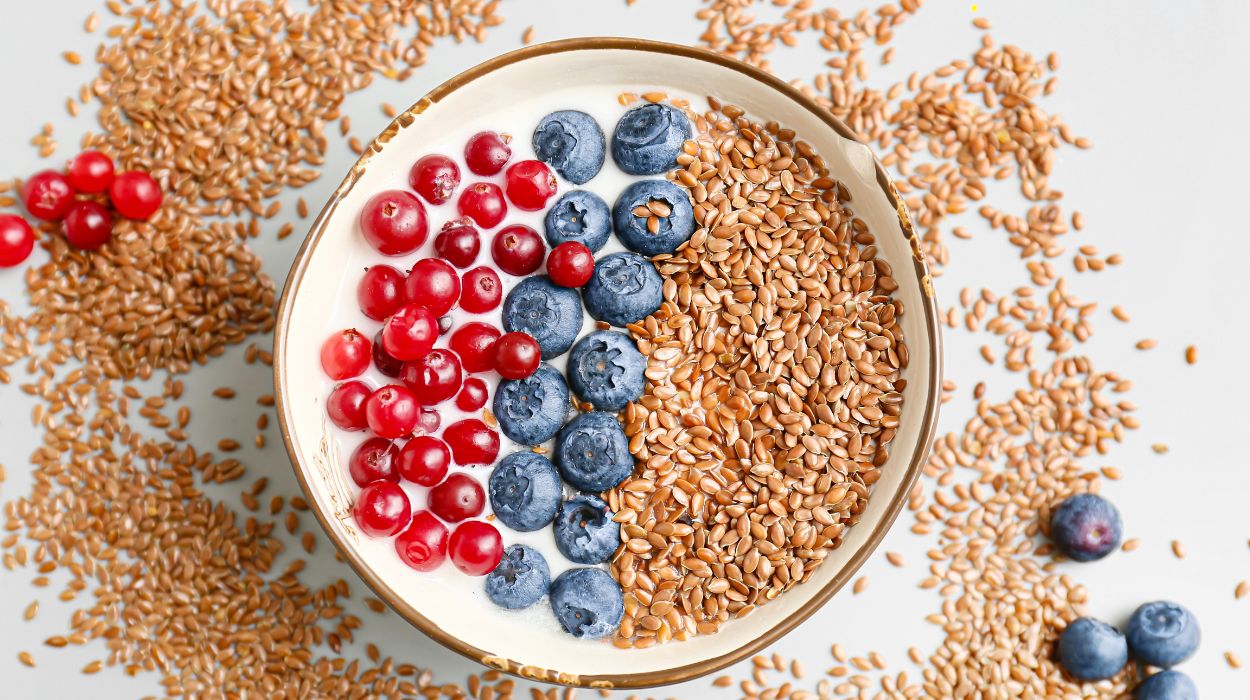Flax seeds are small seeds that come in golden or brown color and are known to be power-packed with essential nutrients and health benefits. Flax seeds are a rich source of fiber, protein, vitamins, minerals, and healthy fats, making them a popular superfood among health-conscious individuals.
This article will delve into some of the health benefits of flaxseed, including promoting heart health, aiding in diabetes control, enhancing digestion, promoting weight loss, supporting healthy skin and hair, and reducing inflammation. Flax seeds are a versatile superfood that can offer various potential health benefits. Besides, flaxseed consumption such as baked goods, smoothies, or oatmeal, including ground flaxseed in your daily diet, is a tasty and effortless way to support overall health and well-being.
Furthermore, this article will provide helpful tips for purchasing and storing flax seeds, the recommended daily intake of flax seeds, and potential downsides to consider while using them.
Top 6 Flax Seeds Benefits
- Promote heart health[1]
- Help control diabetes[2]
- Aid digestion[3]
- Promote weight loss[4]
- Support healthy skin and hair[5]
- Reduce inflammation[6]
Flax Seeds Benefits
Flax seeds, also known as linseeds, are small, golden, or brown-colored seeds that are packed with nutrition and health benefits. They are rich in fiber, protein, healthy fats, vitamins, and minerals, making them a popular superfood among health enthusiasts.
Promote Heart Health
Flax seeds contain alpha-linolenic acid (ALA), an omega-3 fatty acid that helps lower blood pressure, reduce inflammation, and prevent heart disease. Studies have shown that consuming flax seeds regularly can lower the risk of developing heart disease.
Help Control Diabetes
Flax seeds are low in carbohydrates and high in fiber, which helps regulate blood sugar levels and prevent insulin resistance. Regular consumption of flax seeds has been shown to improve insulin sensitivity and reduce the risk of developing type 2 diabetes.
Aid Digestion
Flax seeds are an excellent source of dietary fiber, which promotes regular bowel movements and prevents constipation.
Promote Weight Loss
Flax seeds contain lignans, compounds that have been shown to reduce body fat and promote weight loss. They also have a low glycemic index, which means they won’t cause a spike in blood sugar levels, making them a great addition to any weight loss diet. Check out how to eat flaxseeds for weight loss here!
Support Healthy Skin And Hair
The omega-3 fatty acids in flax seeds help keep the skin hydrated and prevent dryness and flakiness. Flax seeds are chocked full of antioxidants that help guard the skin from damage caused by free radicals. Additionally, flax seeds are rich in vitamin E, which promotes healthy hair growth.
Reduce Inflammation
Flax seeds contain lignans and other anti-inflammatory compounds that help reduce inflammation in the body. This can help alleviate symptoms of inflammatory conditions such as arthritis, asthma, and eczema.
Fax seeds are a highly nutritious and versatile superfood that can provide numerous health benefits. Whether you add them to smoothies, oatmeal, or baked goods, incorporating flax seeds into your diet is an easy and delicious way to support your overall health and well-being.
How To Use Flax Seeds?

Here are some bullet points on how to use flax seeds:
- Add 1-2 tablespoons of ground flax seeds as flaxseed supplementation to smoothies, yogurt, oatmeal, or cereal for an added nutritional boost.
- Use ground flaxseed as a healthy substitute for breadcrumbs in meatloaf or meatballs.
- Mix ground flax seeds with water to create a vegan egg substitute for baking.
- Add ground flax seeds to homemade granola or energy bars for an extra crunch.
- Use flaxseed oil in salad dressings or drizzle it over cooked vegetables for added flavor and nutrition.
- Sprinkle whole or ground flax seeds on top of salads or soups for added texture and nutrition.
- Incorporate ground flax seeds into baked goods such as muffins, bread, or pancakes for added fiber and nutrition.
- Use ground flax seeds as a thickening agent in sauces or gravies instead of flour or cornstarch.
Tips For Purchasing And Storing Flax Seeds
Find Flax Seeds Online Or In Stores
Flax seeds are widely available both online and in stores. Many health food stores, grocery stores, and supermarkets carry flax seeds in their health food or bulk food sections. They may be sold in pre-packaged bags or in bulk, allowing you to purchase the amount you need.
If you prefer the convenience of online shopping, there are many online retailers that sell flax seeds, including health food stores and major retailers like Amazon. However, when shopping online, it’s important to check the seller’s reputation and read customer reviews to ensure that you are getting a quality product.
When purchasing flax seeds, it’s recommended to choose whole seeds instead of ground flax seeds. Whole seeds have a longer shelf life and retain their nutritional value better. You can easily grind the seeds yourself using a coffee grinder or blender to make ground flaxseeds, which can be added to smoothies, yogurt, or oatmeal.
When storing flax seeds, it’s important to keep them in an airtight container in the refrigerator or freezer to maintain their freshness and prevent them from going rancid. This will help ensure that you can enjoy their many health benefits for as long as possible.
Read The Product Label Carefully
When purchasing flax seeds, it’s crucial to read the product label carefully to ensure that you are getting a high-quality product. The label will contain important information about the product, including the ingredients, nutritional information, and any additives or preservatives.
It’s recommended to choose flax seed products that are 100% pure, without any added fillers or preservatives. This ensures that you are getting the full nutritional benefits of the flax seeds and not any unwanted additives.
When checking the label, it’s also important to look for the expiration date. Flax seeds can go rancid quickly if not stored properly, so it’s important to choose a product with a reasonable expiration date to ensure its freshness.
Lastly, if you have any allergies or dietary restrictions, it’s important to carefully read the label to ensure that the product does not contain any ingredients that may trigger an allergic reaction or go against your dietary needs. Some flax seed products may be processed in facilities that also handle nuts or other allergens, so it’s important to be aware of this when making your purchase.
Store Flax Seeds

To maintain the freshness and nutritional value of flax seeds, it’s important to store them properly. Flax seeds contain high amounts of oil and can quickly become rancid if not stored correctly. A cool, dry place like a pantry or cupboard away from direct sunlight is ideal. It’s best to avoid warm or humid environments, as these can lead to spoilage.
Storing flax seeds in an airtight container is recommended to keep out air and moisture. Glass jars with tight-fitting lids or food-grade plastic containers work well. It’s best to store only a small amount of flax seeds in your pantry or cupboard and keep the rest in the freezer. This will ensure the flax seeds stay fresh and maintain their nutritional value for up to a year.
When you’re ready to use your flax seeds, it’s best to grind them just before consumption. Ground flaxseed ensures that the seeds retain their nutrients and flavor. You can use a coffee grinder or food processor to grind the seeds, but be careful not to over-grind them, as this can turn the seeds into a paste.
By storing your flax seeds properly and grinding them just before use, you can enjoy their many health benefits and delicious flavor for months to come.
How Much Flax Seeds Should You Use In A Day?
The daily recommended intake of flax seeds varies based on age, sex, and overall health. However, a general guideline is to consume 1-2 tablespoons of ground flax seeds per day. This amount provides approximately 4-8 grams of fiber and 1.8-3.5 grams of alpha-linolenic acid (ALA), the plant-based omega-3 fatty acids found in flax seeds.
It’s important to note that flax seeds are high in fiber, which can cause digestive discomfort if consumed in excess. It’s recommended to start with a small amount and gradually increase intake over time to allow the digestive system to adjust.
In addition to proper intake, it’s also crucial to store flax seeds properly to maintain their freshness and nutritional value. Whole flax seeds can be stored in an airtight container in the refrigerator for up to six months, while ground flax seeds should be used within a few days or stored in the refrigerator or freezer.
By following the recommended daily intake and proper storage guidelines, you can enjoy the many health benefits of flax seeds without any digestive discomfort or loss of nutritional value.
A Few Downsides To Consider When You Use Flax Seeds
While flax seeds offer numerous health benefits, it’s important to be aware of a few potential downsides.
- First, the high fiber content of flax seeds can cause digestive discomfort in some individuals, especially when consumed in excess or if not adequately hydrated. It’s recommended to start with a small amount and gradually increase intake over time.
- Second, flax seeds contain phytic acid, which can bind to certain minerals and prevent their absorption by the body. However, soaking or sprouting the seeds can help reduce phytic acid content and improve mineral absorption.
- Third, while flax seeds are high in alpha-linolenic acid (ALA), a plant-based omega-3 fatty acid, they may not be as effective as the omega-3 fatty acids found in fatty fish. It’s still beneficial to consume ALA, but it may be important to also include other sources of omega-3s in your diet if you do not eat fish.
- Fourth, if you have a history of hormone-sensitive cancers or are taking certain medications, such as blood thinners, it’s important to consult with a healthcare professional before consuming flax seeds, as they may interact with these medications.
- Overall, while there are a few potential downsides to consider when using flax seeds, they can still be a healthy addition to most people’s diets when consumed in moderation and with awareness of any potential risks.
Conclusion
Flax seeds are a versatile superfood that packs a powerful nutritional punch. Rich in fiber, healthy fats, vitamins, and minerals, they offer numerous health benefits, such as promoting heart health, aiding digestive health, supporting healthy skin and hair, reducing inflammation, and even helping with weight loss and diabetes control.
To get the most out of flax seeds, it’s essential to purchase them from a reputable seller and check the product label for freshness and quality. Proper storage is also crucial to prevent spoilage, and they should be stored in an airtight container in the refrigerator or freezer.
The recommended daily intake of ground flax seeds is 1-2 tablespoons, but it’s best to start with a small amount and gradually increase intake over time to avoid digestive discomfort. It’s important to note that flax seeds contain phytic acid, which can inhibit mineral absorption. Still, soaking or sprouting the seeds can help reduce this effect and make the nutrients more bioavailable.
In summary, incorporating flax seeds into your diet can provide a wide range of health benefits. When consumed in moderation and with proper care, they are an excellent addition to any healthy diet.
Frequently Asked Questions
Yes, flaxseeds can be used as an egg substitute in baking recipes. To replace one egg, mix 1 tablespoon of ground flaxseeds with 3 tablespoons of water and let it sit for a few minutes until it thickens.
Brown and golden flaxseeds are nutritionally similar, but brown flaxseeds have a slightly higher fiber content and may have a nuttier flavor. Golden flaxseeds are often preferred in baking because they have a milder flavor and are less noticeable in the final product.
Yes, flaxseeds can go rancid if not stored properly. Signs that flaxseeds are no longer good to consume include a rancid or stale smell and a bitter or sour taste. It’s recommended to store flaxseeds in an airtight container in the refrigerator or freezer and to use them within six months.
Flaxseed oil is a good source of omega-3 fatty acids, but it lacks the fiber and other nutrients found in whole flaxseeds. Additionally, flaxseed oil should not be heated, as it is not stable at high temperatures and can become rancid. It is best used in cold dishes, such as salad dressings. As with any supplement, it is recommended to consult with a healthcare provider before using flaxseed oil.
 Expert's opinion
Expert's opinion
